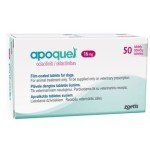
Dogs obviously get the occasional fever (particularly when they have an infection). The first thing you should know: Over 104 degrees °F is concerning for a canine. And (if that’s the case) you’d be right to be worried. A furry Read More …

Dogs obviously get the occasional fever (particularly when they have an infection). The first thing you should know: Over 104 degrees °F is concerning for a canine. And (if that’s the case) you’d be right to be worried. A furry Read More …

Lots of people take baby aspirin as part of a preventative health regimen. Does such a strategy make sense for dogs too? That’s a great question! Here’s what you should know: Low-dose baby aspirin can help your dog with short-term Read More …

Antibiotics are a very common treatment for both people and dogs. Still, there’s a lot of uncertainty about their use. For an infection or most other medical problems, not knowing what to do is normal. Obviously, your dog should be Read More …

Zyrtec is a possibility if your dog has allergies. It can be especially helpful for atopic dermatitis. All sorts of itchiness and irritations of the skin can be alleviated with Zyrtec. The active drug, Cetirizine, can be used off-label. It’s Read More …

Prednisone is a synthetic corticosteroid that vets prescribe to dogs for various illnesses. Sometimes this drug is a life saver. Dogs with certain systemic diseases or other chronic conditions may greatly benefit from taking Prednisone. That said, administering this strong Read More …

Straight to the point: Claritin has higher risks for dogs compared to human use. Nevertheless, the regular version can be carefully given to animals. Of course, your vet should be involved before any antihistamine is used on your dog. It is Read More …

Providing Apoquel to an always itchy dog makes sense (now that supply issues have finally been resolved)! This FDA-approved medication was developed specifically for dogs and reviews are largely positive. Your vet may recommend Apoquel for excessive itchiness (the type Read More …